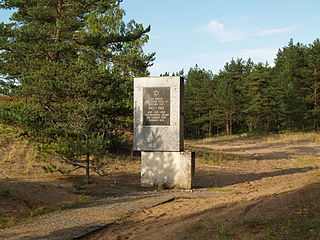
Harju County, is one of the fifteen counties of Estonia. It is situated in Northern Estonia, on the southern coast of the Gulf of Finland, and borders Lääne-Viru County to the east, Järva County to the southeast, Rapla County to the south, and Lääne County to the southwest. The capital and largest city of Estonia, Tallinn, is situated in Harju County. Harju County is the largest county in Estonia in terms of population, as almost half (45%) of the Estonia's population lives in Harju County.

Jõelähtme Parish is a rural municipality in Harju County, north-western Estonia. It has a population of 6,969 and an area of 210.86 km2 (81.41 sq mi), the population density is 25.3770/km2 (65.726/sq mi)

Vaivara was the largest of the 22 concentration and labor camps established in occupied Estonia by the Nazi regime during World War II. It had 20,000 Jewish prisoners pass through its gates, mostly from the Vilna and Kovno Ghettos, but also from Latvia, Poland, Hungary and the Theresienstadt concentration camp. Vaivara was one of the last camps to be established. It existed from August 1943 to February 1944.

Kehra is a town in Anija Parish, Harju County, Estonia, most known for its pulp and paper mill.
Jägala is a village in Jõelähtme Parish, Harju County, in northern Estonia. It lies on the Jägala river, south of the Tallinn–Narva road, about 28 km (17 mi) east of Tallinn. The Jägala–Käravete road (T13) starts in Jägala and passes through the village centre. Jägala had 139 inhabitants in 2007.
A number of war crimes trials were held during the Soviet occupation of Estonia (1944–1991). The best-known trial was brought in 1961, by the Soviet authorities against local collaborators who had participated in the Holocaust during the German occupation (1941–1944). The accused were charged with murdering up to 5,000 German and Czechoslovakian Jews and Romani people near the Kalevi-Liiva concentration camp in 1942–1943. The public trial by the Supreme Court of the Estonian SSR was held in the auditorium of the Navy Officers Club in Tallinn and attended by a mass audience. All three defendants were convicted and sentenced to death, one in absentia. The two defendants present for the trial were executed shortly after. The third defendant, Ain-Ervin Mere, was not available for execution.

The Holocaust in Estonia refers to the Nazi crimes during the 1941-1944 occupation of Estonia by Nazi Germany.

Kalevi-Liiva are sand dunes in Jõelähtme Parish in Harju County, Estonia. The site is located near the Baltic coast, north of the Jägala village and the former Jägala concentration camp. It is best known as the execution site of at least 6,000 Jewish and Roma Holocaust victims.

Jägala Falls is a waterfall in northern Estonia on the Jägala River. It is the largest natural waterfall in Estonia, with a width of about 50 meters (160 ft) and a height of about 8 meters (26 ft). Jägala Falls is located in Koogi in Harju County.

Jägala concentration camp was a labour camp of the Estonian Security Police and SD during the German occupation of Estonia during World War II. The camp was established in August 1942 on a former artillery range of the Estonian Army near the village of Jägala, Estonia. It existed from August 1942 to August 1943. Aleksander Laak, an Estonian, was appointed by SS-Sturmbannführer Ain-Ervin Mere of Group B of the Estonian Security Police to command the camp with Ralf Gerrets as assistant.
Aleksander (Alexander) Laak was a lieutenant and the commander of the Jägala concentration camp during the German occupation of Estonia.
Jägala Army Base is a disused military base of the Estonian Defence Forces in Jägala village in Jõelähtme Parish, Harju County, Estonia. The base is located about 25 kilometres to the east of Tallinn.
Jõesuu is a village in Jõelähtme Parish, Harju County in northern Estonia. It is located on the around the mouth of the Jägala River to the Ihasalu Bay, north of Jägala Falls.
Jägala-Joa is a village in Jõelähtme Parish, Harju County in northern Estonia. It's lies on the right bank of the Jägala River.
Koogi is a village in Jõelähtme Parish, Harju County in northern Estonia. It's lies on the left bank of the Jägala river. The Tallinn–Narva road passes Koogi and has an intersection with Jägala–Aegviidu–Käravete road (T13). Koogi has 95 inhabitants (2005).

Manniva is a village in Jõelähtme Parish, Harju County in northern Estonia. It's located west of the mouth of the Jägala River to the Ihasalu Bay, and about 7 km (4 mi) east of the town of Maardu.
Vetepere is a village in Järva Parish, Järva County in northern-central Estonia. As of 2011 Census, the settlement's population was 27. With a comparatively large area, Vetepere comprises several bogs including Kakerdaja, Kautla, Kodru and Laeksaare bogs. Vetepere is passed by the Jägala, Ambla and Tarvasjõgi rivers.
Inge Sylten was a young Jewish girl from Czechoslovakia who was deported in a transport from Theresienstadt Ghetto to Estonia in September 1942. Heinz Drosihn was an SS-Unterscharführer and the commandant of Ereda concentration camp in Estonia. Their paths intersect in the camp, where they fell in love, were forced to flee, and subsequently were shot or committed suicide during their flight to Scandinavia. Their story was preserved mainly thanks to fellow inmates of Inge Sylten. The Czech filmmaker and researcher Lukáš Přibyl called their story "... Romeo and Juliet story in a concentration camp".

The Jägala is a 98.8 km (61.4 mi) long river in northern Estonia that flows into the Gulf of Finland in Jõesuu, Harju county.







